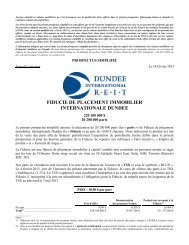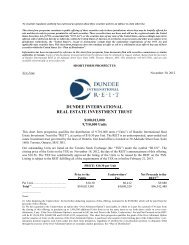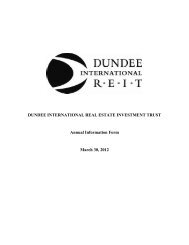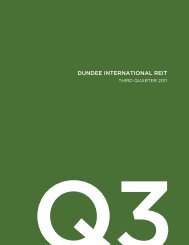Annual Report 2011 - Dundee International REIT
Annual Report 2011 - Dundee International REIT
Annual Report 2011 - Dundee International REIT
You also want an ePaper? Increase the reach of your titles
YUMPU automatically turns print PDFs into web optimized ePapers that Google loves.
DUNDEE INTERNATIONAL <strong>2011</strong> <strong>Annual</strong> <strong>Report</strong><br />
Concentration of properties and tenants<br />
Currently, all of our properties are located in Germany and as a result are impacted by economic and other<br />
factors specifically affecting the real estate markets in Germany. These factors may differ from those affecting<br />
the real estate markets in other regions. Due to the concentrated nature of our properties, a number of our<br />
properties could experience any of the same conditions at the same time. If real estate conditions in Germany<br />
decline relative to real estate conditions in other regions, our cash flows and financial condition may be more<br />
adversely affected than those of companies that have more geographically diversified portfolios of properties.<br />
We derive a significant portion of our rental income from Deutsche Post. Consequently, our revenues are<br />
dependent on the ability of Deutsche Post to meet its rent obligations and our ability to collect rent from<br />
Deutsche Post.<br />
Financing<br />
We require access to capital to maintain our properties as well as to fund our growth strategy and significant<br />
capital expenditures. There is no assurance that capital will be available when needed or on favourable terms.<br />
Our access to third-party financing will be subject to a number of factors, including general market conditions;<br />
the market’s perception of our growth potential; our current and expected future earnings; our cash flow and<br />
cash distributions and cash interest payments; and the market price of our Units.<br />
A significant portion of our financing is debt. Accordingly, we are subject to the risks associated with debt<br />
financing, including the risk that our cash flows will be insufficient to meet required payments of principal and<br />
interest, and that on maturities of such debt we may not be able to refinance the outstanding principal under<br />
such debt or that the terms of such refinancing will be more onerous than those of the existing debt. If we are<br />
unable to refinance debt at maturity on terms acceptable to us or at all, we may be forced to dispose of one<br />
or more of our properties on disadvantageous terms, which may result in losses and could alter our<br />
debt-to-equity ratio or be dilutive to unitholders. Such losses could have a material adverse effect on our<br />
financial position or cash flows.<br />
The degree to which we are leveraged could have important consequences to our operations. A high level of<br />
debt will: reduce the amount of funds available for the payment of distributions to unitholders and interest<br />
payments on our Debentures; limit our flexibility in planning for, and reacting to, changes in the economy and<br />
in the industry and increase our vulnerability to general adverse economic and industry conditions; limit our<br />
ability to borrow additional funds, dispose of assets, encumber our assets and make potential investments;<br />
place us at a competitive disadvantage compared to other owners of similar real estate assets that are less<br />
leveraged and therefore may be able to take advantage of opportunities that our indebtedness would prevent<br />
us from pursuing; make it more likely that a reduction in our borrowing base following a periodic valuation<br />
(or redetermination) could require us to repay a portion of then outstanding borrowings; and impair our ability<br />
to obtain additional financing in the future for working capital, capital expenditures, acquisitions, general trust<br />
or other purposes.<br />
Tax matters<br />
Although we have been structured with the objective of maximizing after-tax distributions, tax charges and<br />
withholding taxes in various jurisdictions in which we invest will affect the level of distributions made to us by<br />
our subsidiaries. No assurance can be given as to the level of taxation suffered by us or our subsidiaries.<br />
Currently, our revenues are derived from our investments located in Germany. It is possible that certain of our<br />
subsidiaries could be subject to German corporate income tax on their net rental income and capital gains<br />
from the sale of properties. Although we have managed our tax affairs on the assumption that certain of our<br />
subsidiaries will be subject to German corporate income tax (with a view to minimizing, to the extent possible,<br />
the amount of taxable income from operations in Germany), there is no certainty that we will not pay German<br />
corporate income tax. In addition, German real estate transfer tax (“RETT”) is triggered when among other<br />
PAGE 28






